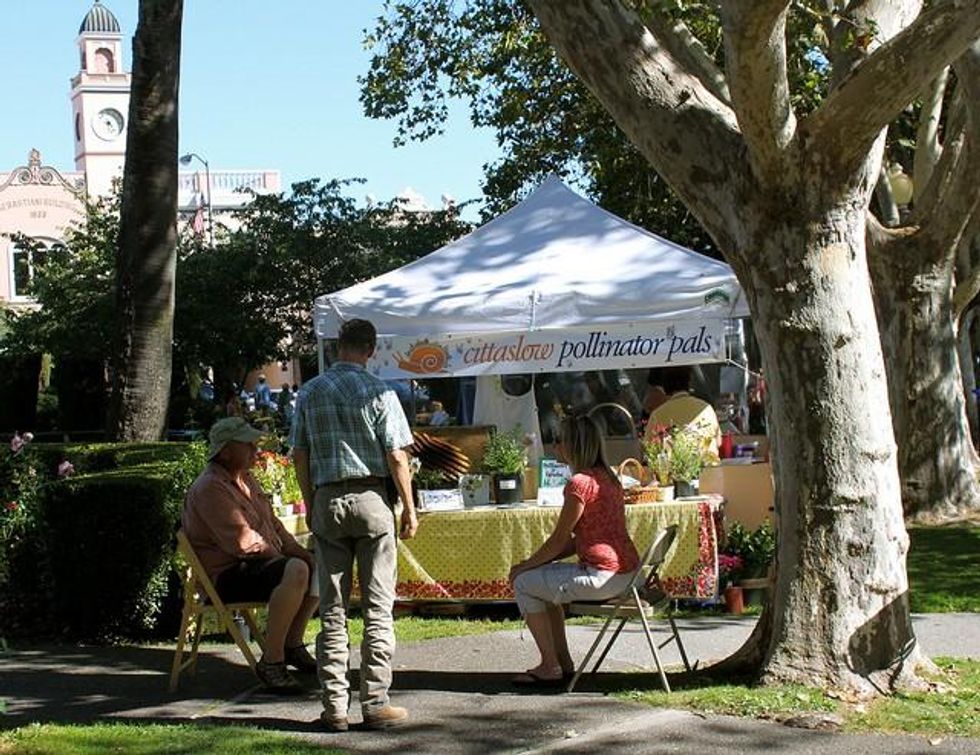

SUBSCRIBE TO OUR FREE NEWSLETTER
Daily news & progressive opinion—funded by the people, not the corporations—delivered straight to your inbox.
5
#000000
#FFFFFF
To donate by check, phone, or other method, see our More Ways to Give page.


Daily news & progressive opinion—funded by the people, not the corporations—delivered straight to your inbox.
In the midst of climate change, "big box" stores, frequent lack of community connections, and ubiquitous fast and processed food, a flourishing movement stands in stark contrast.

"Cittaslow is about appreciating what we are and what we have, without being self-destructive and depleting values, money and resources," Pier Giorgio Oliveti, director of Cittaslow, told AFP.
Cittaslow, headquartered in Orvieto, Italy, got its start 15 years ago in a small Tuscan town "to enlarge the philosophy of Slow Food to local communities," and now boasts roughly 160 towns spanning 28 countries.
Cittaslow's website explains that Slow Cities "are strong communities that have made the choice to improve the quality of life for their inhabitants." Specifically, the characteristics of these Slow Cities are that they

In the face of austerity's tightening grip, Oliveti told AFP that the philosophy of Cittaslow can offer part of the solution by "privileging a community's qualities, such as craftmanship, technology or tourism, and using them as a key to overcome the economic crisis."
Among the list of Slow Cities are three in the U.S., all in California: Sonoma, Fairfax and Sebastopol.
Sonoma Valley, the first of the three to join the movement, says its "mission is to be a catalyst for sustainable well-being for all."
_______________
Dear Common Dreams reader, The U.S. is on a fast track to authoritarianism like nothing I've ever seen. Meanwhile, corporate news outlets are utterly capitulating to Trump, twisting their coverage to avoid drawing his ire while lining up to stuff cash in his pockets. That's why I believe that Common Dreams is doing the best and most consequential reporting that we've ever done. Our small but mighty team is a progressive reporting powerhouse, covering the news every day that the corporate media never will. Our mission has always been simple: To inform. To inspire. And to ignite change for the common good. Now here's the key piece that I want all our readers to understand: None of this would be possible without your financial support. That's not just some fundraising cliche. It's the absolute and literal truth. We don't accept corporate advertising and never will. We don't have a paywall because we don't think people should be blocked from critical news based on their ability to pay. Everything we do is funded by the donations of readers like you. Will you donate now to help power the nonprofit, independent reporting of Common Dreams? Thank you for being a vital member of our community. Together, we can keep independent journalism alive when it’s needed most. - Craig Brown, Co-founder |
In the midst of climate change, "big box" stores, frequent lack of community connections, and ubiquitous fast and processed food, a flourishing movement stands in stark contrast.

"Cittaslow is about appreciating what we are and what we have, without being self-destructive and depleting values, money and resources," Pier Giorgio Oliveti, director of Cittaslow, told AFP.
Cittaslow, headquartered in Orvieto, Italy, got its start 15 years ago in a small Tuscan town "to enlarge the philosophy of Slow Food to local communities," and now boasts roughly 160 towns spanning 28 countries.
Cittaslow's website explains that Slow Cities "are strong communities that have made the choice to improve the quality of life for their inhabitants." Specifically, the characteristics of these Slow Cities are that they

In the face of austerity's tightening grip, Oliveti told AFP that the philosophy of Cittaslow can offer part of the solution by "privileging a community's qualities, such as craftmanship, technology or tourism, and using them as a key to overcome the economic crisis."
Among the list of Slow Cities are three in the U.S., all in California: Sonoma, Fairfax and Sebastopol.
Sonoma Valley, the first of the three to join the movement, says its "mission is to be a catalyst for sustainable well-being for all."
_______________
In the midst of climate change, "big box" stores, frequent lack of community connections, and ubiquitous fast and processed food, a flourishing movement stands in stark contrast.

"Cittaslow is about appreciating what we are and what we have, without being self-destructive and depleting values, money and resources," Pier Giorgio Oliveti, director of Cittaslow, told AFP.
Cittaslow, headquartered in Orvieto, Italy, got its start 15 years ago in a small Tuscan town "to enlarge the philosophy of Slow Food to local communities," and now boasts roughly 160 towns spanning 28 countries.
Cittaslow's website explains that Slow Cities "are strong communities that have made the choice to improve the quality of life for their inhabitants." Specifically, the characteristics of these Slow Cities are that they

In the face of austerity's tightening grip, Oliveti told AFP that the philosophy of Cittaslow can offer part of the solution by "privileging a community's qualities, such as craftmanship, technology or tourism, and using them as a key to overcome the economic crisis."
Among the list of Slow Cities are three in the U.S., all in California: Sonoma, Fairfax and Sebastopol.
Sonoma Valley, the first of the three to join the movement, says its "mission is to be a catalyst for sustainable well-being for all."
_______________